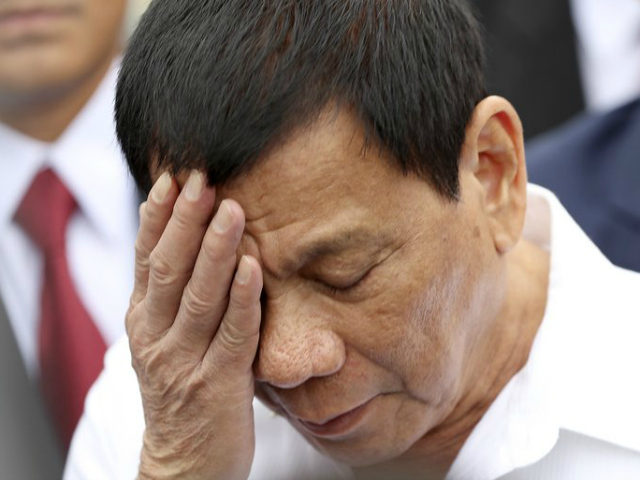Philippine President Rodrigo Duterte announced on Wednesday that he intends to leave office before his term ends. “I will step down by 2020, I will not wait for 2022. I am old. I have no more ambition. I really would like to rest,” the 72-year-old president said.
The context for Duterte’s remarks is that he established a panel of legal experts last month to craft changes to the Philippine Constitution that would ostensibly make it closer to the federalist model of the United States. The national legislature has already initiated the process of changing the constitution, which is only about 30 years old.
Duterte critics believe the amendment process is moving too quickly, possibly because Duterte and his allies want to wipe out term limits so they can hold office in perpetuity.
They also worry that the process will create a “twilight zone” in between scrapping the old national charter and adopting a new one, a period during which the president could seize dictatorial powers, much as Ferdinand Marcos did in the seventies. The 1987 Constitution was crafted with an eye toward preventing such abuses of power. Previous efforts to revise it have been skeptically viewed as underhanded attempts to abolish term limits.
“This is a very partisan period in our history and it is no time to do these things,” retired Philippine Supreme Court Justice Vicente Mendoza argued last month. “The risks that constitutional reform might be used as an excuse for extending stays in office and shifting to federalism are just too great to offset the need to make these changes.”
“It’s not that this Constitution is flawless or a great Constitution. I do not think it is,” Mendoza conceded. “It needs amendments. The trouble is, if you do that, politicians will come in and bring proposals to extend their term.”
Duterte critics point to his authoritarian style and say that he cannot be trusted to renovate the Constitution without expanding his own powers and those of allied government officials, no matter how much he talks about the urgent need to embrace federalism to combat income inequality.
They are not reassured by his praise of Ferdinand Marcos as a national “hero” who was unfairly maligned after he was driven into exile or his enduring friendship with the Marcos family, which made a remarkable political comeback in recent years. Duterte enraged many by ordering a hero’s funeral for Marcos in 2016; the 32nd anniversary of the Marcos ouster last month turned into a rally denouncing Duterte as a “fascist” whose constitutional amendment initiative is a ploy to assume dictatorial powers.
Furthermore, Duterte was reportedly overheard saying that he must rule as a “dictator, a son of a bitch” or else “nothing will happen in this country” at about the same time his initiative to change the Constitution got underway. His administration argued that he was speaking figuratively, which is something he does often, and pointed out that he previously asked the Philippine military to shoot him if he ever becomes a dictator. Duterte’s office did not clarify whether he wanted the army to use figurative or literal bullets when it shoots him.
Duterte nevertheless remains fairly popular with the Philippine public, thanks to a strong economy, even though his poll numbers tend to fluctuate after he makes especially provocative statements. His critics concede that shrewd political instincts lie beneath his headline-grabbing bluster. More than a few American analysts think that story sounds familiar. They usually are not smiling when they say it. Given the current strength of Duterte’s party, his effort to change the Constitution is considered likely to succeed, possibly within the next month or two.

COMMENTS
Please let us know if you're having issues with commenting.